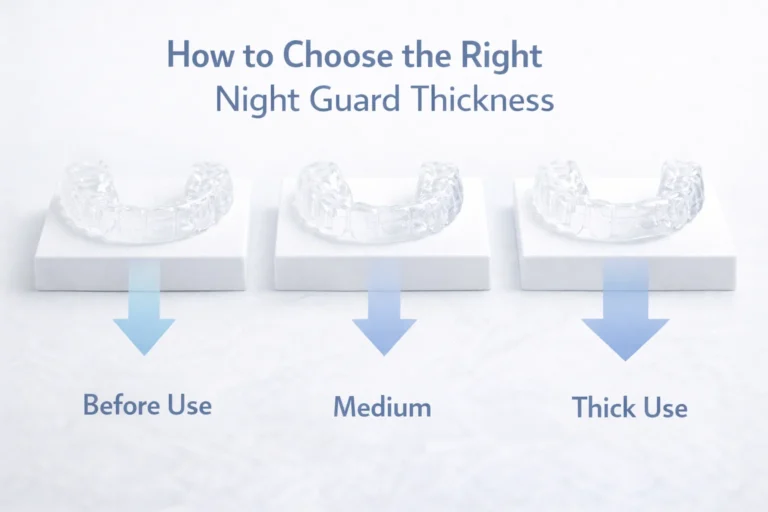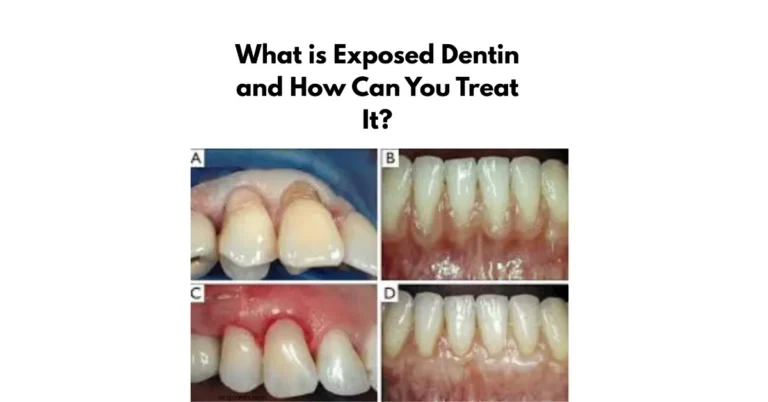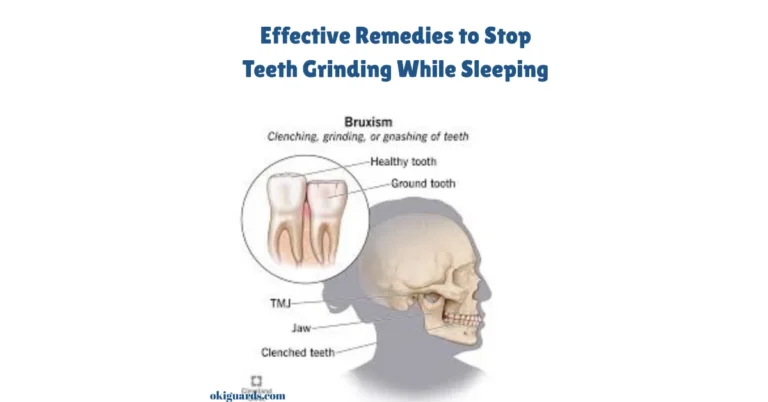10 Side Effects of Bruxism (Teeth Grinding)
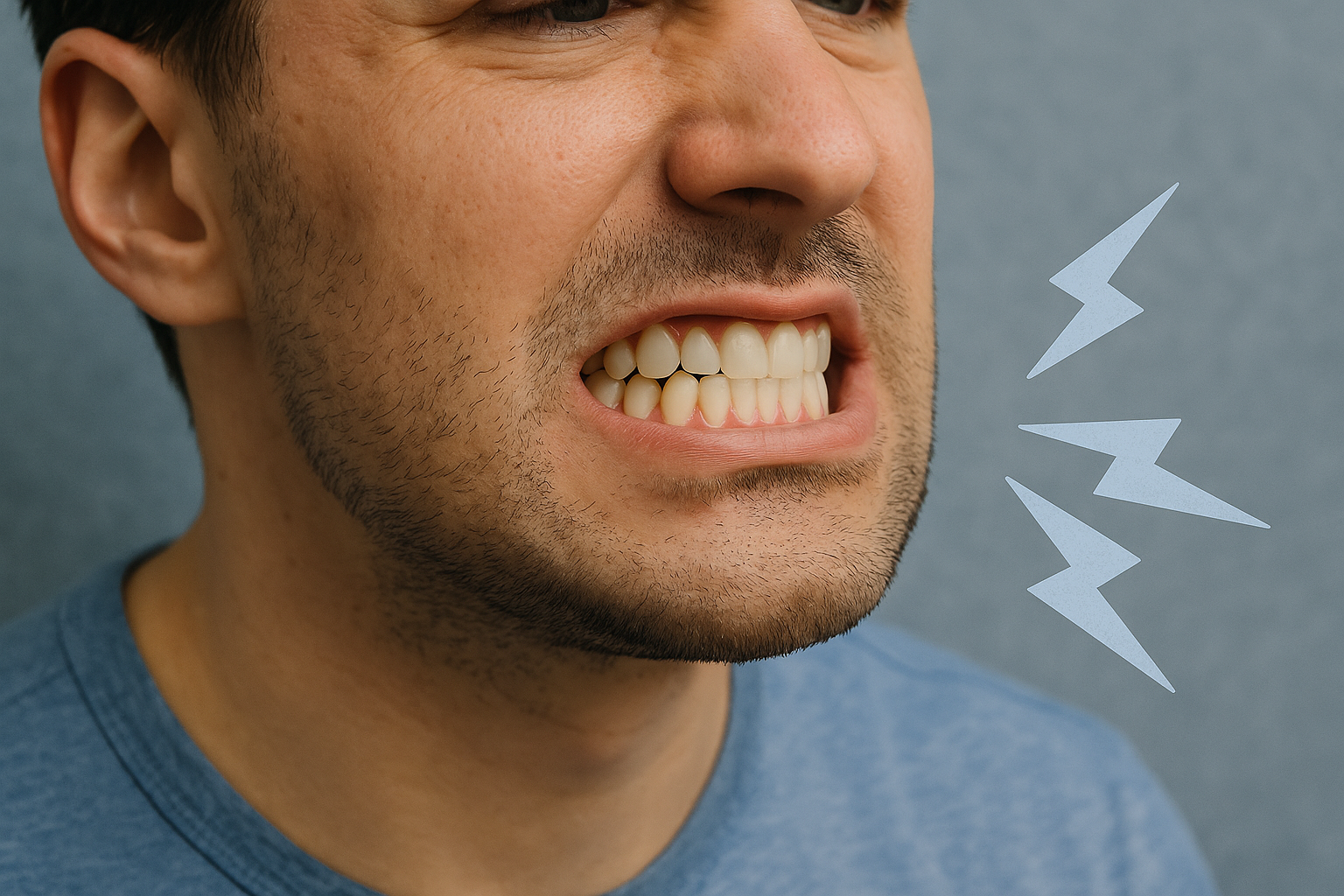
Severe Jaw pain, sensitivity and temple pain- why? The answer is simple and clear, you might be grinding or clenching teeth usually during sleep collectively called bruxism. It is not as simple as seen, ignoring it can cause serious health issues over time. While the habit can be silent, its effects aren’t: it wears down enamel, stresses jaw joints, disturbs sleep, and can make dental work fail earlier than expected.
Quick take: A custom night guard doesn’t “cure” bruxism, but it shields teeth and restorations from nightly forces while you and your clinician work on stress, sleep, and bite factors.
This guide explains the 10 most important side effects, why they happen, and realistic steps to protect your teeth.
1) Enamel Wear & Flattened Biting Surfaces
What happens:
Teeth are designed with peaks and valleys (cusps) that mesh like gears. Humans can apply 250 (Psi) pounds per square inch when bite or grind, it’s a large force. When upper and lower arches come in contact during grinding, slowly teeth enamel starts damaging, and peaks convert into flat, shiny planes. You might notice shorter-looking teeth, edges that look glassy, or a yellowish cast from exposed dentin.
Why it matters:
Once Enamel damage, it doesn’t grow back. Thinner enamel increases cavity risk and sensitivity, and can change your bite over time.
What helps:
A custom-fit guard physically separates upper and lower teeth to prevent tooth-on-tooth abrasion. Add fluoride gels or varnish per your dentist’s advice for extra enamel support, and keep cleanings consistent.
2) Cracks, Chips & Fractures
What happens:
Repetitive microtrauma causes micro-cracks that increase with time. At first, you may feel a sharp edge with your tongue; later, a piece breaks off or a tooth hurts when releasing a bite .
Why it matters:
Fractures can require onlays, crowns, or even root canals if the crack reaches the pulp. Ignored cracks spread and become harder to treat conservatively.
What helps:
Night protection between jaws can reduce forces, plus timely restoration if a crack is active. You can use teeth guards of thickness according to your grinding intensity.
For more Detail: Custom Teeth Night Guards
3) Damaged Restorations (Fillings, Crowns, Veneers, Implants)
What happens:
Grinding loads are not gentle on dental work. Fillings can damage, crown cement can loosen, veneer margins can remove, and even implant crowns can show wear on the opposing teeth.
Why it matters:
Redoing restorations is expensive and removes more teeth each time. Repeated failures shorten the lifespan of everything in that chewing system.
What helps:
A guard that matches your force level distributes load and reduces shock. Your dentist also helps you to rebalance bite contacts (occlusal adjustment) so biting forces spread more evenly.
For more Detail: Custom Teeth Night Guards

4) Sensitivity (Hot, Cold, Sweet)
What happens:
When enamel thins due to extensive dental grinding or the gumline recedes, the inner dentin is closer to the surface due to which ice water, hot soup, and sweets can cause sharp zings.
Why it matters:
Sensitivity discourages good brushing and flossing (“it hurts, so I avoid it”), which can spiral into plaque buildup and decay.
What helps:
Guard wear + non-abrasive sensitivity toothpaste. Avoid harsh whitening until sensitivity settles. Your dentist can suggest something else according to intensity by adding desensitizers or recommend fluoride trays if needed.
5) Tooth Mobility & Gum
What happens:
Heavy jaw clenching exerts excessive forces on teeth and supporting tissues. Teeth starts feeing loose at certain times of day; gums can look inflamed even with good hygiene.
Why it matters:
If you are already facing periodontitis, bruxism acts like a multiplier, accelerating bone loss and mobility.
What helps:
Night protection with hard night guard if you are excessive grinder, meticulous home care, and periodontal maintenance. For advanced forces, hard acrylic guards tend to be more stable than soft guards that compress.
6) TMJ Pain & Jaw Dysfunction
What happens: The part of head that connects the jaw to the skull is called the temporomandibular joint, or TMJ. These joints and surrounding ligaments endure extra load. You may hear clicks, feel morning stiffness, or notice limited opening after a long grinding night.
Why it matters: Joint strain can progress to chronic pain and functional limits. In severe cases, people avoid certain foods or yawn cautiously to prevent locking.
What helps: A custom guard to reduce load, gentle jaw stretching and heat/ice per clinician advice, and evaluation of posture and daytime clenching. Persistent or worsening symptoms warrant a TMJ-savvy dentist or orofacial pain specialist.
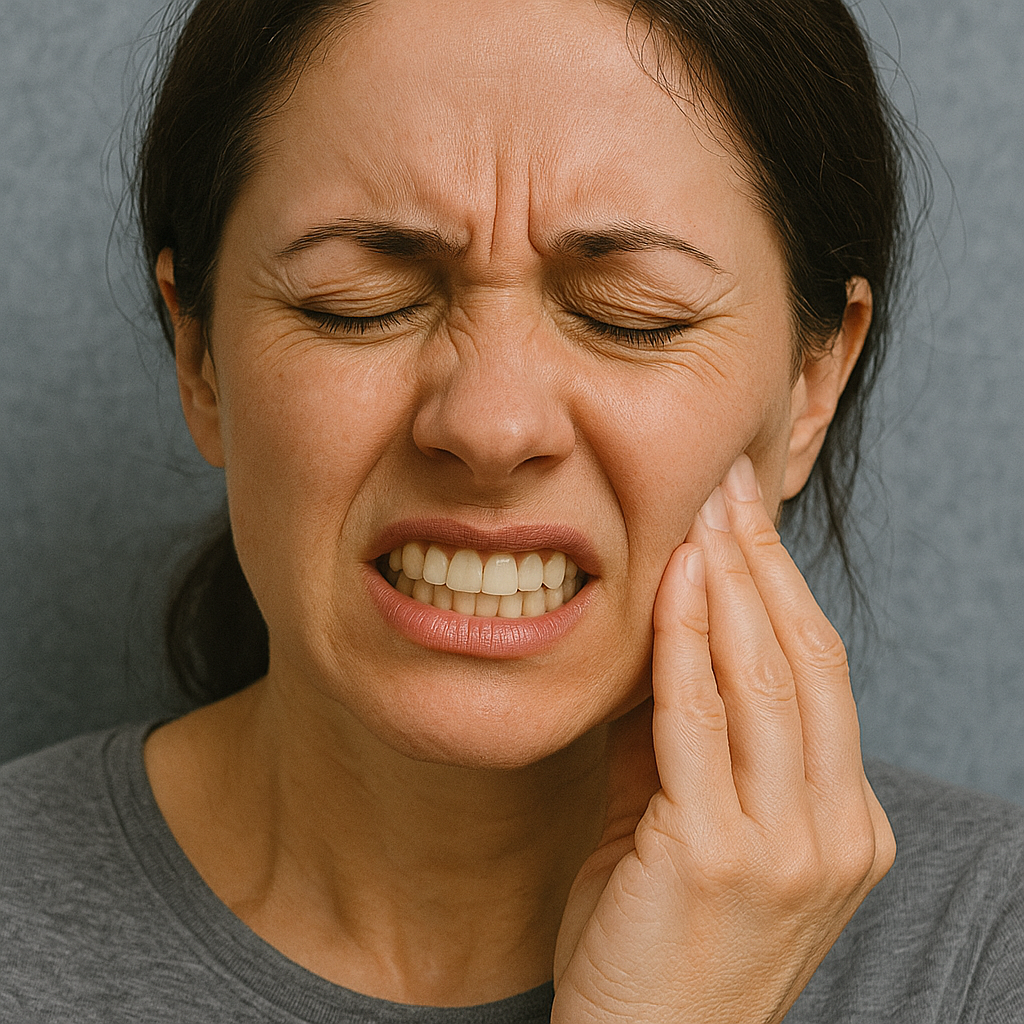
7) Headaches, Facial & Neck Pain
What happens:
When you feel headache, temples, pain on backside of eyes, cheeks and even neck, it’s bruxism. You start a dull morning which proceeds until next night and cycle repeats.
Why it matters:
This pain decreases productivity, spoils mood, and exercise motivation.
What helps:
Consistent guard wear, hydration, magnesium if appropriate, posture breaks, and daytime habit retraining (“teeth apart, lips together”). Breathwork, short walks, wind-down routines, help more than you think.
8) Ear Symptoms

What happens: TMJ structures share nerve pathways and close real estate with the ear canal. Inflammation and muscle tension can create pressure, tenderness, or occasional tinnitus.
Why it matters: People often see a GP for “ear infections” that aren’t infections. That delays dental evaluation and relief.
What helps: Guard protection + TMJ care often calms ear sensations. A clinician should still rule out true ear disease if symptoms persist or if you have fever/discharge.
9) Poor Sleep & Daytime Fatigue
What happens:
Bruxism episodes can trigger arousals that fragment sleep architecture. Partners hear unpleasant grinding sounds, and you wake unrefreshed even after “8 hours in bed.”
Why it matters:
Poor sleep damages focus, mood, metabolism, and recovery. In some people, bruxism coexists with snoring.
What helps:
Use a teeth guard and tighten sleep hygiene: consistent bed/wake times, dim evening light, no heavy meals late, and limit caffeine after early afternoon. If snoring, gasping, or severe daytime sleepiness are present, ask your doctor.
10) Jaw Muscle Hypertrophy (Wider Jawline Appearance)
What happens:
Muscles grow with chronic overuse. The masseters—your bite engines—can enlarge, giving a boxier jawline in some people.
Why it matters:
Aesthetic concern aside, hypertrophy signals high bite forces that put teeth and restorations at risk.
What helps:
Night protection, trigger reduction (stress stimulants, excessive gum chewing), and bite evaluation. Discuss cosmetic options with your dentist if appearance is a concern.
Causes & Risk Factors (Why You Grind)
- Stress & anxiety: The #1 daytime and nighttime trigger.
- Sleep factors: Fragmented sleep, snoring/OSA, irregular schedules.
- Stimulants & substances: Late caffeine, nicotine, some antidepressants or ADHD meds (discuss with your prescriber; don’t stop meds on your own).
- Bite mechanics: High spots, crossbites, or missing teeth can change how forces distribute.
- Lifestyle habits: Chewing ice, pens, or hard snacks primes muscles for overuse.
- Reality check: Most people have multiple contributors. Protect teeth now, then chip away at triggers with your dentist/physician.
Day Time Clenching
Bruxism isn’t only nocturnal. Many people clench during the day while driving, working, or lifting. A simple loop to break it:
- Notice jaw contact (teeth should rest apart at baseline).
- Drop your shoulders, unclench your tongue from the palate.
- Breathe out slowly and let the jaw hang for two seconds.
- Reset: “Teeth apart, lips together.”
- Repeat every time you catch it; set phone reminders hourly for a week.
This tiny habit change can dramatically lower evening muscle tension.
Thing That Actually Helps (Realistic & Practical)
1) Protect at night (now):
A custom night guard is the fastest way to reduce wear and fracture risk. It creates a barrier, spreads force, and can calm the neuromuscular system by giving consistent contact.
2) Match the guard to your grinding level:
- Soft (1.5–2.0 mm): Light clenching/sensitivity/first-timers.
- Hybrid (2.0–2.5 mm): Soft inside + hard outside for moderate grinding (great balance).
- Hard acrylic (2.0–3.0 mm): Moderate–heavy forces or fast wear history; longest life.
3) Choose the arch wisely:
Most start with an upper guard for retention. Pick lower if you have an upper gag reflex/appliances, or per dentist advice. Comfort is personal—swap arches if adaptation stalls.
4) De-stress the system:
Wind-down routine (screens off, warm shower), journaling or breathwork (4-7-8), and micro-breaks during focused work. If you wake unrefreshed or snore, request airway evaluation.
5) Dental follow-through:
Professional cleanings, crack checks, and bite balancing keep things stable. If restorations are failing repeatedly, ask about material choice and force management (thicker/harder guard).
How a Custom Night Guard Works
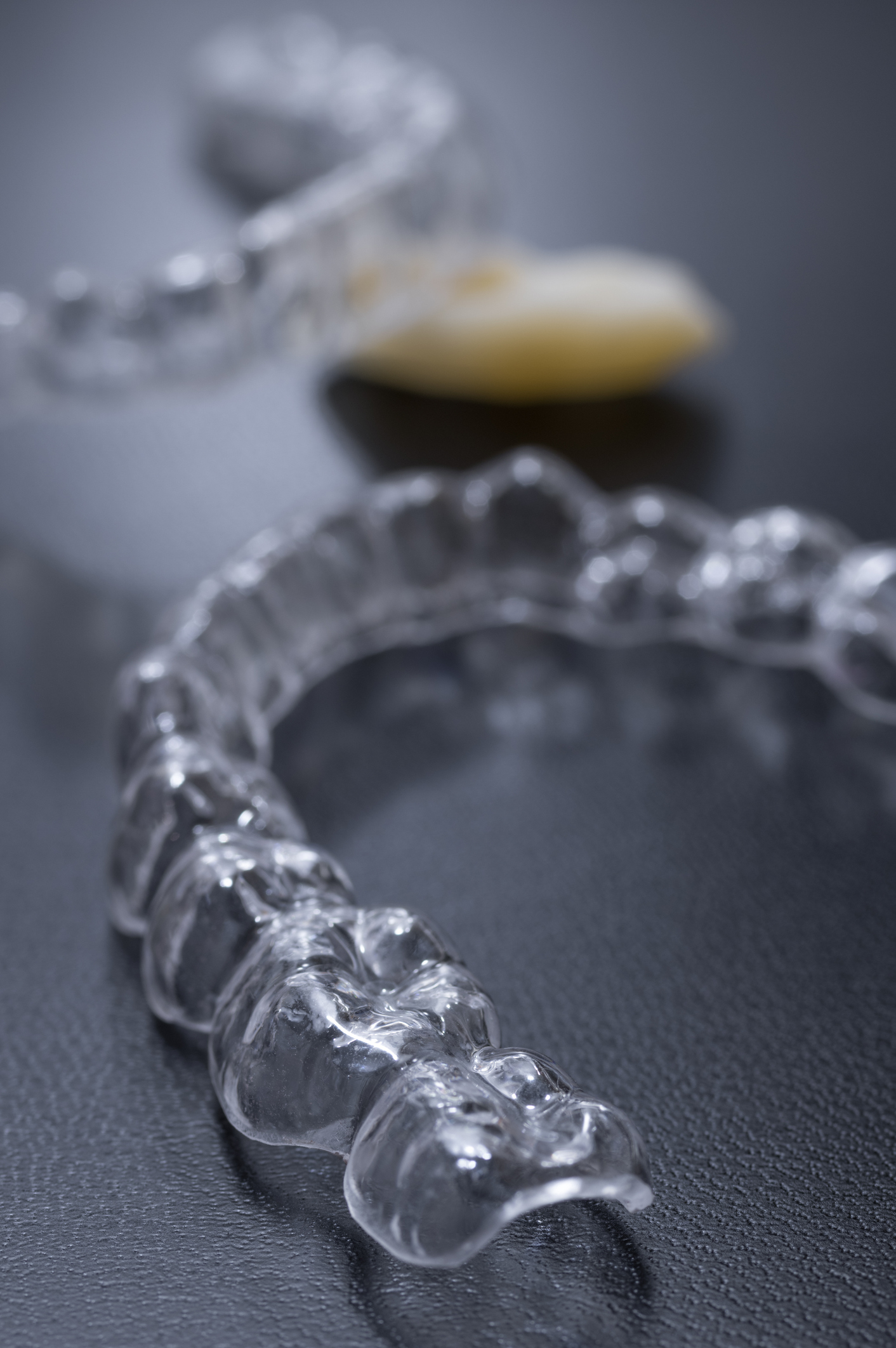
- Order the model and thickness that fits your force level.
- Receive your impression kit with tray, putty, and clear instructions.
- Practice once, then take your final impression (5–7 minutes).
- Mail it back using the prepaid label.
- Our lab fabricates a precise, polished guard from medical-grade, BPA-free material.
- You receive your guard and start protecting your smile the same night.
Fit guarantee: If something feels off—too tight, rough edges—contact support within the guarantee window. Minor polishing or a remake can fine-tune comfort.
When To Seek Professional Help (Red Flags)

- Sharp pain on biting, a sudden fracture, or persistent throbbing → urgent dental visit
- Jaw locking, severe limitation in opening, swelling, or trauma → dentist/TMJ specialist
- Snoring, observed apneas, or daily sleepiness despite time in bed → ask your physician about sleep testing
Ready to Protect Your Teeth?
Pick the protection that matches your grinding level and get started in days:
- Soft Custom Night Guard Comfort for light clenching
- Hybrid Custom Night Guard Comfort + durability for moderate grinding
- Hard Custom Night Guard Max protection for heavy forces


